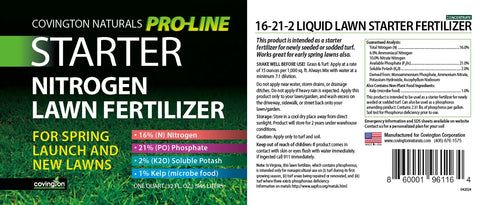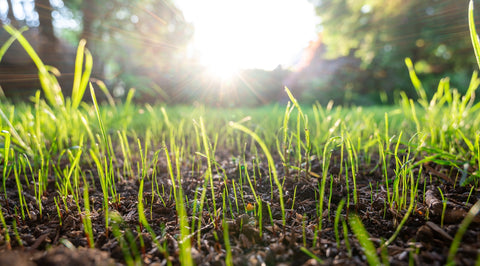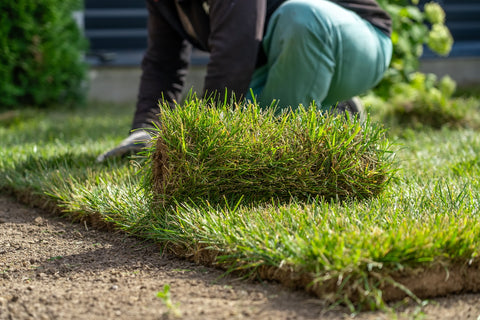UNDERSTANDING COVINGTON NATURALS LIQUID LAWN STARTER FERTILIZER

Usually when we get calls asking about a new product, the customer simply wants to know, how will this product improve my lawn, plants, shrubs, and trees. And how do I apply it? But on occasion, we get asked, “What’s REALLY in this product?” So I sat out to define in minute’ detail, what’s actually in the product and WHAT does each ingredient do for foliage. Keep in mind, I’m the kind of guy that reads the credits after a series or movie, I want to know who starred, the secondary actors, executive producers, where it was filmed etc; etc; not because I’m ADD, It’s just the older I get, the more curious it seems I appear…..and yes, it drives my wife crazy once in a while LOL.
The first two paragraphs answer the question succinctly and easily, what’s in our Liquid Lawn/Grass Starter Fertilizer and how do I use it? But if you can stay awake for the details, read on!

Product Description
Introducing the 16-21-2 Covington Starter Fertilizer, designed to use on all types of grass & turf, meticulously crafted to provide everything grass seed requires for rapid growth and a strong start. This premium blend of nitrogen, phosphorus, and potassium, enriched with Humic Acids and sea kelp, nurtures the soil surrounding the seeds, ensuring swift germination and nourishing the emerging turf.
The versatile Covington formula is ideal for addressing Phosphorus deficiency in soils or as part of a comprehensive fertility regimen for various turf varieties. Whether applied directly over seeds during planting, as a pre-plant treatment, or mixed into a topdressing medium, Covington Starter Fertilizer sets the foundation for vibrant and healthy turf growth.
You can use it on newly seeded areas, newly laid turf, hydro-mulch, or as an early application for spring starts.

Covington Starter Fertilizer contains:
Total Nitrogen (N)...........................16.0%
6.0% Ammoniacal Nitrogen
10.0% Nitrate Nitrogen
Available Phosphate (P2O5)............ 21.0%
Soluble Potash (K2O).........................2.0%
Derived from: Monoammonium Phosphate,
Ammonium Nitrate, Potassium Hydroxide,
Ascophyllum Nodosum
ALSO CONTAINS NON-PLANT FOOD INGREDIENTS:
1.0% Kelp (Microbe food)
How Do I Use It?
SHAKE WELL! The mixed product should be agitated prior to and during application.
Warm Season Turf: Apply at a rate of 15 ounces per 1,000 sq. ft. Mix with water at a minimum 7:1 dilution. Apply directly to foliage or to soil at seeding.
Cool Season Turf: Apply at a rate of 15 ounces per 1,000 sq. ft. Mix with water at a minimum 7:1 dilution. Apply directly to foliage or to soil at seeding.
You can apply with a hose sprayer, Pump Sprayer, Backpack Sprayer, or Ride On. If you need more detail about the different types of sprayers, there are tons of videos on YouTube as well as Blogs on our website.
Also, if you are interested in where Nitrogen comes from... read our blog entitled Where does Nitrogen Come from? LOL
For a breakdown of the ingredients, read on!
6.0% Ammoniacal Nitrogen
Ammoniacal nitrogen refers to the form of nitrogen that is readily available to plants in the form of ammonium ions (NH4+). This nitrogen source is essential for plant growth as it plays a crucial role in various biological processes, including photosynthesis, protein synthesis, and the overall development of plants.
There are several reasons why ammoniacal nitrogen is beneficial for soil and plants:
- Readily Available: Plants can easily uptake and utilize ammoniacal nitrogen, making it an efficient nitrogen source for immediate plant growth.
- Low Leaching: Ammonium ions have a lower tendency to leach out of the soil compared to nitrate ions, which helps in reducing nitrogen loss through leaching and ensures a more sustained supply for plant uptake.
- Acidifying Effect: Ammoniacal nitrogen can slightly acidify the soil, which is beneficial for plants that thrive in acidic conditions.
- Promotes Root Development: Adequate levels of ammoniacal nitrogen can stimulate root development, leading to healthier and more robust plant growth.
- Enhances Protein Synthesis: Nitrogen is a key component of proteins, so a good supply of ammoniacal nitrogen promotes protein synthesis, which is essential for plant growth and development.
In summary, ammoniacal nitrogen is advantageous for soil and plants due to its availability, low leaching potential, impact on soil pH, role in root development, and contribution to protein synthesis. It is a vital nutrient that supports healthy plant growth and overall productivity in agricultural and gardening contexts.
10.0% Nitrate Nitrogen
Nitrate nitrogen is a form of nitrogen that is readily absorbed by plants and plays a crucial role in their growth and development. It is one of the essential nutrients required by plants for various physiological processes, including photosynthesis, protein synthesis, and overall plant metabolism.
Here are some reasons why nitrate nitrogen is beneficial for plants and soil:
- Plant Growth: Nitrate nitrogen serves as a primary source of nitrogen for plants, promoting healthy growth, leaf development, and overall plant vigor.
- Protein Synthesis: Nitrate nitrogen is a key component in the synthesis of proteins within plants, which are essential for their structure and function.
- Yield and Productivity: Adequate levels of nitrate nitrogen in the soil can enhance crop yield and productivity by supporting robust plant growth and development.
- Soil Fertility: Nitrate nitrogen contributes to soil fertility by providing a vital nutrient for plant uptake, which in turn maintains the health and balance of the soil ecosystem.
- Nutrient Cycling: Nitrate nitrogen plays a role in nutrient cycling within the soil, helping to maintain a sustainable supply of nutrients for plant growth over time.
In summary, nitrate nitrogen is important for plants and soil as it supports plant growth, protein synthesis, yield, soil fertility, and nutrient cycling, all of which are essential for healthy and productive plant growth.
Available Phosphate (P2O5)............ 21.0%
Phosphates are naturally occurring compounds that contain phosphorus, a vital nutrient for plant growth. They play a crucial role in promoting healthy plant development, particularly in grass and soil, for the following reasons:
- Essential Nutrient: Phosphorus, found in phosphates, is one of the primary macronutrients required by plants for various physiological processes such as photosynthesis, energy transfer, and root development.
- Promotes Root Growth: Phosphates help stimulate root development in plants, including grass, enabling better nutrient absorption and overall plant health.
- Enhances Flowering and Fruit Production: Adequate phosphates support the production of flowers and fruits in plants, contributing to robust growth and reproduction.
- Improves Soil Fertility: Phosphates can enhance soil fertility by replenishing phosphorus levels, which may become depleted over time due to plant uptake or leaching.
- Facilitates Nutrient Uptake: Phosphates play a role in improving the efficiency of nutrient uptake by plants, ensuring they have access to essential elements for optimal growth.
To optimize plant, grass, and soil health, it's important to provide the necessary phosphates through fertilizers or organic amendments, considering the specific needs of the plants and the soil composition.
Soluble Potash (K2O).........................2.0%
Soluble potash, a common term for the water-soluble form of potassium, is an essential nutrient that plays a crucial role in the health and development of plants, grass, and the overall structure of the soil. In plants, potassium is vital for photosynthesis, nutrient uptake, and water regulation, directly influencing growth rates, yield quality, and resistance to drought, pests, and diseases. For grass, soluble potash promotes strong root development and improves the resilience to environmental stressors like extreme temperatures and heavy foot traffic. Within the soil ecosystem, potassium helps in maintaining the soil's physical properties, enhancing water retention, and improving aeration. This nutrient's multifaceted benefits underscore its importance in promoting vigorous plant growth, lush green lawns, and fertile soils.
What is monoammonium phosphate, potassium hydroxide, Ascophyllum nodosum, kelp and why are they good for plants, grass, and soil?
Monoammonium phosphate (MAP) is a widely used fertilizer that provides plants with a high content of phosphorus and nitrogen, essential nutrients for their growth and development. Potassium hydroxide, on the other hand, is an alkaline compound that can be used to adjust soil pH levels, making it more favorable for plant growth.
Ascophyllum nodosum, commonly known as kelp, is a type of seaweed rich in micronutrients, growth hormones, and amino acids that can improve soil structure and stimulate plant growth.
These substances are beneficial for plants, grass, and soil due to the following reasons:
- Monoammonium Phosphate (MAP):
- Phosphorus: Essential for root development, flowering, and fruiting.
- Nitrogen: Important for overall plant growth and leaf development.
- Potassium Hydroxide:
- pH Adjustment: Helps optimize soil pH for better nutrient uptake by plants.
- Ascophyllum Nodosum (Kelp):
- Micronutrients: Provides a range of essential minerals for plant health.
- Growth Hormones: Stimulate plant growth and enhance resistance to stress.
- Amino Acids: Aid in protein synthesis and overall plant vigor.
By incorporating these substances into plants, grass, and soil, you can enhance nutrient availability, promote healthy growth, improve soil structure, increase resistance to diseases and stresses, and ultimately boost the overall health and productivity of your garden or crops.
If you actually made it to the end of this lengthy discussion about our Lawn Starter and think it might be for you, give us a call at (405) 676-1575 and tell us you read the WHOLE thing! and we will reward you with a 20% discount!! Thanks for your interest and KEEP GROWIN'

Storage: Store in a cool dry place away from direct sunlight. Product will store for 2 years under warehouse conditions.
Apply in accordance with best management practices (BMP’s) established by your Cooperative Extension Service. Observe any State or Local fertilizer application regulations.
Caution: Apply only to turf and soil.
Keep out of Reach of Children: If product comes in contact with skin or eyes, flush with water immediately.









